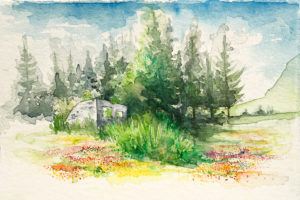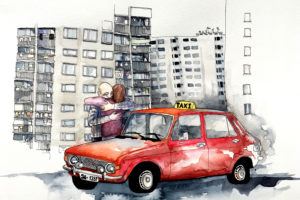“Why Trnovo?”
I was about to visit my dad’s property in the mountains of Trnovo, a small city an hour away from Sarajevo, Bosnia & Herzegovina. I hadn’t been there since I was 11, but I remembered it as a magical place where wild deer, bears and wolfs roamed the deep forests, and the hills were covered in wild flowers and cold and clear rivers. That was before the Balkan war started and we moved to Australia. My parents separated: I lost touch with my dad after he moved to New Zealand.
After the war, I visited Sarajevo a couple of times, but it wasn’t my city anymore. I had no family left there, and the sense of not belonging broke my heart. But this time, I wanted to go visit my dad’s property although I knew that the house was burned down and the trip might ruin my memories. I hoped I could remember how to get to my dad’s property. I had no address.

We hailed a taxi and Kemal picked us up, a friendly man in his late 50s. His eyes lit up when I mentioned Trnovo.
“I have a country house close by. I can drop you off and then pick you up when you want to come back,” he explained. We negotiated a price and set off.
“Why Trnovo?” Kemal asked, genuinely interested.
Somehow, I found myself opening up to him, a person I had only just met. I told him about my childhood, my father, and how much this trip meant to me. He listened. My story was probably like many he listened to as a taxi driver in Sarajevo – families broken by war, exile and a sense of alienation and not belonging.
I was hungry and asked for a stop at a shop. Instead, Kemal invited us to his country house to have breakfast with him. He had left bread and chicken pate in the house the last time he was there, so “it was meant to be.”
He fed us. The humble breakfast nurtured my soul, even as it nourished my body. He showed us his veggie patch, told us about plans for the property but also about his wife’s PTSD.
“It’s getting better though,” he declared optimistically.
The next few hours were magical. I managed to find the property. Although my dad’s house was an overgrown ruin, it was still green and luscious. Flowers were everywhere. Nature reclaimed the land. The place was as wild and beautiful as I remembered.
Kemal picked us up later in the afternoon. Excited to hear what I experienced, he drove us the long way back to Sarajevo on a more scenic route. “Could we stop to buy some water?” I asked.
“I have a better idea,” he responded. He took us to a fresh mountain stream, took bottles from his car and filled them up for us. It was the freshest and sweetest water I had ever tasted.

When we arrived, Kemal got out of the car and we hugged. I felt like I was saying goodbye to my uncle.
About the artist and story contributor
 Nina Rupena is a visual artist based in Melbourne Australia. With background in fine art, illustration and industrial design, she tends to work across mediums and practices. Her interests lie in people, stories and creating connections through art. For more info visit her page www.ninarupena.com.au
Nina Rupena is a visual artist based in Melbourne Australia. With background in fine art, illustration and industrial design, she tends to work across mediums and practices. Her interests lie in people, stories and creating connections through art. For more info visit her page www.ninarupena.com.au
